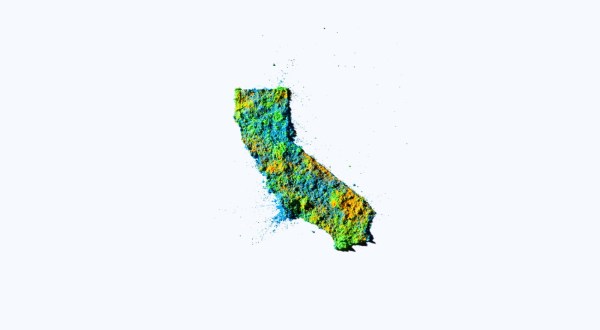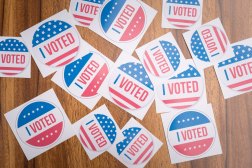Civil rights groups decry states’ management of voter registration databases

A coalition of civil rights groups is sounding the alarm ahead of the November elections, charging that a variety of states are improperly managing voter databases in ways that could disenfranchise minority communities.
A number of organizations, including the Leadership Conference on Civil and Human Rights, the American Civil Liberties Union, and the NAACP Legal Defense and Educational Fund, teamed up to release a new report on the issue Friday. The groups charge that the Supreme Court’s ruling in a 2013 case undermined the protections of the Voting Rights Act of 1965, opening the door for discriminatory practices that make it more difficult for people of color to vote.
The groups cite a host of issues with state election administration in the wake of the decision, including several potential problems with the IT techniques elections officials use to cull their databases of registered voters.
“This has been a case of voter suppression made easy by the court,” Wade Henderson, president and CEO of the Leadership Conference on Civil and Human Rights, said during a conference call with reporters. “These changes have already impacted races in state, local and school board elections and could have major impact on races in November.”
Specifically, Henderson believes the court’s ruling in Shelby County v. Holder rendered the longstanding provision requiring that states seek permission from the federal government before making changes in voting districts with histories of racial discrimination “functionally inoperable.” He said that’s let some states purge their voter databases and change the way they monitor that information “without any notice or transparency.”
“Before Shelby, all these changes were available for analysis for any potential discrimination,” Henderson said. “Now, many go into effect without many voters even knowing.”
He points to Virginia’s management of its voter database as a key example of this problem in action.
In 2013, the state’s Legislature voted to direct registrars to use the federal Department of Homeland Security’s “Systematic Alien Verification for Entitlements” database to check if people registered to vote were also U.S. citizens. However, Henderson believes that practice is “extremely problematic,” because the federal database is prone to massive inaccuracies.
“Those databases have a terrible rate of accuracy and using them in this manner probably produces as many false results as it does identifying individuals who aren’t eligible to vote,” Henderson said.
Indeed, a 2012 report by the department’s Office of Inspector General found that one in every eight times analysts tried to use the database to identify a person’s immigration status, they received incorrect information.
[Read more: Police endanger civil rights with body camera policies, report says]
Henderson also notes that the database only contains information on people that the department has verified are not citizens, yet contains no listing of all registered U.S. citizens, making it an incomplete resource for states to use. He charges its use amounts to a “fishing expedition” by the state that overwhelmingly targets minority communities.
“We’ve not heard of any individuals who have registered to vote whom the DHS database would suggest aren’t citizens of the United States,” Henderson said.
Anita Earls, executive director of the North Carolina-based Southern Coalition for Social Justice, added that her state’s Board of Elections is also considering using the database to monitor its voter rolls. But beyond concerns over the accuracy of the data, she also worries that the state could end up using imprecise algorithms to sort the information, creating more errors.
“Even if the data they’re using is correct, if the matching parameters are not done correctly, then you’ll have a lot of false positives and people getting kicked off the rolls when they shouldn’t be,” Earls said.
Henderson admits that he’s unsure how many other states are even using the federal database to maintain their voter rolls — Florida adopted the practice in 2012 and a PolitiFact analysis in 2013 found that several states applied with the department for permission to do so. But he expects that “other states may be inclined to do so” if they have “high concentrations of individuals who may be citizens but from immigrant communities.”
But because of the high court’s decision limiting disclosures about these sorts of changes, he lamented that it’s difficult to get a handle on how many states are indeed using these practices.
“These are only some of the changes we know about,” Henderson said.
With a hotly contested election approaching, Henderson believes Congress must address these issues, since he feels these voting changes are “designed to shave off a few points where a minor difference could swing the outcome of the election.”
In particular, he pointed to the “Voting Rights Advancement Act” sponsored by Rep. Terri Sewell, D-Ala., as a key measure lawmakers could advance to restore transparency to state voter registration management processes. The legislation has languished under the consideration of the House Judiciary Committee for nearly a year, though 176 representatives signed a petition earlier this month asking that the bill be considered by another committee instead.
Henderson hopes to spur other lawmakers to sign on and get the bill moving, in an effort to prompt some sort of change before voters go to the polls.
“It’s unconscionable that the committee hasn’t taken action before now,” Henderson said. “Congress needs to pay attention to this.”
Contact the reporter at alex.koma@statescoop.com, and follow him on Twitter @AlexKomaSNG.






